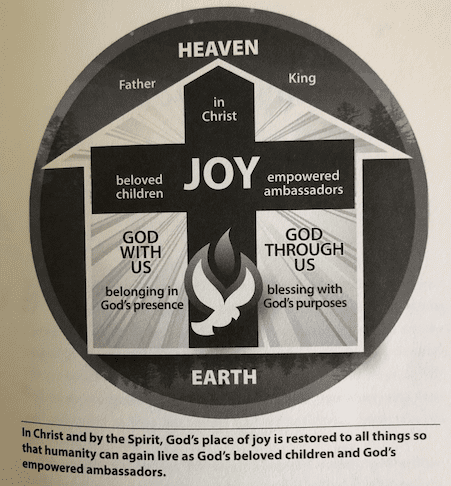I would like to share with you something I have been considering recently. It relates to faith, loyalty, royalty and idolatry. Some of my thinking is still raw but it might set off something in your thinking and cause you to look at what the Bible says about it in a new way.
Something Matthew Bates said resonated with me. Matthew is an author of books and has affiliations with the OnScript podcast. He posed a question on something I was listening to in regards to Jesus’ ministry before he went to the cross. Was that all for nothing? In short, no! Jesus’ ministry was demonstrating his rule and reign in why he came.
The idea about kingship relates well to the subject of allegiance and loyalty. I am currently exploring both themes. Jesus sets up his followers and prepares them for his royal priestly reign before he dies. He knows he has to die and so his teachings (which can be found in the sermon on the mount ** and other parts of The Gospel’s) are for that purpose.
This next paragraph I found by Richard Beck is really helpful as I’d already jumped to Hebrews 11 in my mind and how it works with this idea of loyalty. I am not an expert but maybe the word faithfulness might be better used here in the context of this chapter and makes so much more sense to me than being all about belief as I’ve often been taught.
‘But pistis (faith) means something much more than “belief.” Pistis is better translated as fidelity, faithfulness, loyalty, and allegiance. To have faith means to keep faith – to hold fast, to endure, to remain, to stay, to never falter or betray. Faith is an inseverable bond. An unbreakable promise. An unshakable commitment. An unwavering loyalty. Faith is courage, endurance, and steely resolve. Faith is the blood of the martyrs.
Another way to think about this, especially faith-as-allegiance, is that, in the Biblical imagination, there is no space for free moral agency. Every space has a Power or a Lord. The only option before you, therefore, is to whom you will swear allegiance. As Bob Dylan sang, “You’ve gotta serve somebody.”‘
And furthermore the blogger relates it to idolatry.
‘This is why the opposite of faith isn’t “unbelief” but idolatry – betraying your love, breaking your promise, serving another lord. And again, the issue of idolatry isn’t here a mental game, a game of “believing” in this or that. Idolatry, says the theologian William Cavanaugh, is less about your metaphysical or ontological beliefs than a lifestyle that betrays your fundamental allegiances:
Idolatry is not primarily considered to be a metaphysical error, a question of ontology. The key question is not what people believe but how they behave. What constitutes idolatry is usually not the mistaken attribution of certain qualities to material objects, but the attitude of loyalty that people adopt toward created realities … Idolatry is primarily a way of life, not a metaphysical worldview … the Bible appears to consider allegiance most commonly to be the decisive factor in separating idolatry from true worship.‘
What this person says really sits well with me but it’s quite a bit to think on after what I’ve been led to think about idolatry. There is also space for doubt in this idea. We are not thrown out on the rubbish heap as those who follow Christ if we have doubts. Even those who were there when Jesus commissioned his disciples written about in the end of Matthew 28 had their doubts but they were still included in that proto-church.
Faith is not just what we believe in. It’s not about mental assent only. Yes it’s believing but it’s not alone it’s with loyalty. Believing loyalty. Thanks to Holy Spirit through Michael Heiser (Naked Bible Podcast transcript) that set me off thinking more along these lines a few years ago. *** This certainly makes more sense about apostasy which Hebrews 6 speaks of and the sin against the Holy Spirit. There is a proviso in our following Jesus which can often be overlooked – we need to continue in the faith i.e. our allegiance to Jesus, for example Colossians 1.23; 1 Thessalonians 3.8; John 8.31; Romans 11.22; 1 Timothy 4.16
You might ask how did I get to the king concept? This is a thread that runs through the Biblical narrative. The theme relates to allegiance. Maybe it’s from the idea of gods with a small ‘g’. The idea of gods is spoken of in the book of Genesis. If we look at the surrounding cultures of the Old Testament times there is often reference to other gods. We as humans are a tiny bit lower than the heavenly beings (Ps 8 and Hebrews 1) like gods but not the same. Yet we were called to rule over the creation – like a king (not a despot!). See the Bible project video on image of God below.
The whole concept can be seen in the wider context too of the Old Testament when there’s lots of gods believed in by the people of the surrounding nations. That is still evident today around the world. It’s not that the gods don’t exist, It’s more about them submitting to Almighty God. (They were meant to be the guardians of the nations but they rebelled and led the nations astray – hence another reason that Jesus has come in a nut shell) This message is clear to the people of Israel in the ten commandments. You shall have no other gods before me being the second commandment. Could this have been the temptation that the serpent presented Eve? To be like the other gods could have been a very real temptation for eve as she would have seen and experienced what they were like. This is one particular view of the Genesis 3 passage (Digging around in the garden of Eden). Adam was also there so there’s no excusing him either!!
There is more to dig around on but for now I shall leave it there.
Psalm 136:1 (LHB): הוֹד֣וּ לַיהוָ֣ה כִּי־ט֑וֹב כִּ֖י לְעוֹלָ֣ם חַסְדּֽוֹ׃
Psalm 136:1 (LEB): Give thanks to Yahweh, for he is good, for his loyal love endures forever.
Diagram
**An aside that caught my eye which I found in researching this article is a paragraph and an image written about by Scott McKnight. I saw the image and it really moved me. Sometimes images do it more than words. It’s also simple which I like. The paragraph is this:

Many have undertaken to be “more biblical” about the gospel and the most recent is a fine study by Cyd Holsclaw and Geoff Holsclaw. (Confession: Geoff is a colleague of mine at Northern.) Their new book is called Does God Really Like Me? Discovering the God Who Wants to be With Us.
Theirs is a study that explores the gospel through the idea of “with-ness.” A very helpful term. This is a fresh study that can be used easily in churches.
An existential question they ask is a deep gospel question: OK, God loves us but does God like us? Put differently, does God want to be with us? Great question because it permits them to reframe the gospel itself. The gospel is about God coming to be with us in Christ and indwelling us through the Spirit so that we become the abiding place of God, God’s temple, in this world. Our purpose is to bless the world by mediating God’s joyful presence.
Scott McKnight Patheos
